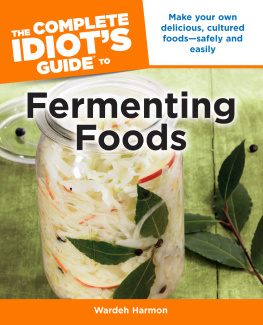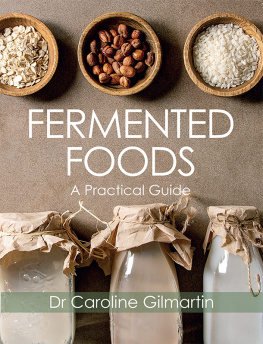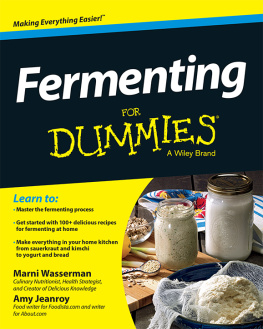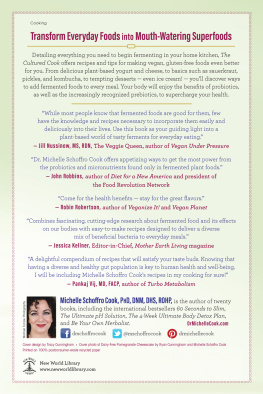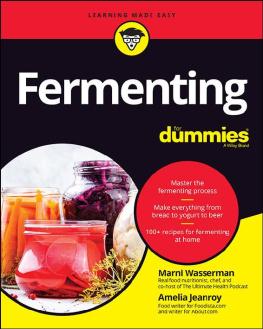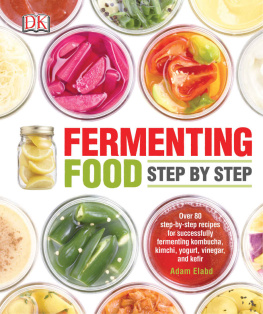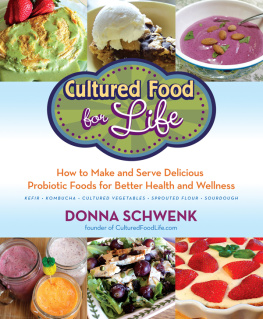
Fermenting
Foods
by Wardeh Harmon

A member of Penguin Group (USA) Inc.
I dedicate this book to my parents, Ibrahim and Martha Bisharat, who filled my childhood with yogurt, cheese, olives, and pickles, and who gave me my love for cultured foods.
ALPHA BOOKS
Published by the Penguin Group
Penguin Group (USA) Inc., 375 Hudson Street, New York, New York 10014, USA Penguin Group (Canada), 90 Eglinton Avenue East, Suite 700, Toronto, Ontario M4P 2Y3, Canada (a division of Pearson Penguin Canada Inc.) Penguin Books Ltd., 80 Strand, London WC2R 0RL, England Penguin Ireland, 25 St. Stephens Green, Dublin 2, Ireland (a division of Penguin Books Ltd.) Penguin Group (Australia), 250 Camberwell Road, Camberwell, Victoria 3124, Australia (a division of Pearson Australia Group Pty. Ltd.) Penguin Books India Pvt. Ltd., 11 Community Centre, Panchsheel Park, New Delhi110 017, India Penguin Group (NZ), 67 Apollo Drive, Rosedale, North Shore, Auckland 1311, New Zealand (a division of Pearson New Zealand Ltd.) Penguin Books (South Africa) (Pty.) Ltd., 24 Sturdee Avenue, Rosebank, Johannesburg 2196, South Africa Penguin Books Ltd., Registered Offices: 80 Strand, London WC2R 0RL, England
Copyright 2012 by Wardeh Harmon
All rights reserved. No part of this book shall be reproduced, stored in a retrieval system, or transmitted by any means, electronic, mechanical, photocopying, recording, or otherwise, without written permission from the publisher. No patent liability is assumed with respect to the use of the information contained herein. Although every precaution has been taken in the preparation of this book, the publisher and author assume no responsibility for errors or omissions. Neither is any liability assumed for damages resulting from the use of information contained herein. For information, address Alpha Books, 800 East 96th Street, Indianapolis, IN 46240.
THE COMPLETE IDIOTS GUIDE TO and Design are registered trademarks of Penguin Group (USA) Inc.
ISBN: 978-1-101-58021-9
Library of Congress Catalog Card Number: 2011938635
14 13 12 8 7 6 5 4 3 2 1
Interpretation of the printing code: The rightmost number of the first series of numbers is the year of the books printing; the rightmost number of the second series of numbers is the number of the books printing. For example, a printing code of 12-1 shows that the first printing occurred in 2012.
Printed in the United States of America
Note: This publication contains the opinions and ideas of its author. It is intended to provide helpful and informative material on the subject matter covered. It is sold with the understanding that the author and publisher are not engaged in rendering professional services in the book. If the reader requires personal assistance or advice, a competent professional should be consulted.
The author and publisher specifically disclaim any responsibility for any liability, loss, or risk, personal or otherwise, which is incurred as a consequence, directly or indirectly, of the use and application of any of the contents of this book.
Most Alpha books are available at special quantity discounts for bulk purchases for sales promotions, premiums, fund-raising, or educational use. Special books, or book excerpts, can also be created to fit specific needs.
For details, write: Special Markets, Alpha Books, 375 Hudson Street, New York, NY 10014.
| Publisher:Marie Butler-Knight | Copy Editor:Jan Zoya |
| Associate Publisher:Mike Sanders | Cover Designer:Kurt Owens |
| Executive Managing Editor:Billy Fields | Book Designers:William Thomas, Rebecca Batchelor |
| Acquisitions Editor:Brook Farling | Indexer:Tonya Heard |
| Development Editor:Jennifer Bowles | Layout:Brian Massey |
| Senior Production Editor:Janette Lynn | Proofreader:John Etchison |

Introduction
I grew up appreciating and enjoying a select-few fermented foods, mostly Middle Eastern: goat cheese, yogurt, and olives. But I never learned to make anything fermented myself until I grew up and had a family of my own. I embraced fermentation for many reasons, all intertwined. Some of our health challenges were resolved by eating regular servings of fermented, cultured foods. I saw that fermentation meets a need for preservationwithout modern refrigeration, freezing, or high-pressure canning. Keeping our own family milk cow means we have gallons upon gallons of creamy Jersey milk to turn into cheese or other cultured dairy foods. I already loved sour, complex flavors, but I got ridiculously excited about being able to ferment foods myself. And perhaps most importantly, I saw Gods hand in creating the wild, beneficial organisms that we simply put to work for us in smart (not hard) ways.
We may never know all the differences fermented foods make in our bodies (but I share known health benefits in ). Some changes are imperceptible or could be attributed to many factors, and some things we just cant know this side of Heaven. But what we do know is so very encouraging. I feel privileged to be able to share the skills of fermenting foods with you.
I got my experience in fermentation a bit haphazardly. I did a little dabbling here and there before I got serious, and then I tackled fermentation by food type. I created simple beverages, then krauts and pickles, then dairy and sourdough. Here and there I tucked in experiments with chutneys and meats and fish. My family and I liked some of what I made and hated other things. Fermented foods and their complex, sour flavors take some adjustment for most modern folks and we were no exception. I had more than a few flops. I made crumbly, dry, tasteless cheese. I made bitter sauerkraut. I made mushy pickles. Experience is a wonderful teacher, as they say. I think I got a great education.
Along the way, I improved my fermentation skills and got into a groove. I learned what was happening during fermentation and why it was happening. The more I experienced it hands-on through bubbling jars and crocks on my counter, the more I could adapt and adjust and even break rulesand succeed. I learned what were the rules and what were not. These are important nuances born of trial and error.
Im beyond excited about fermenting foods. I love to do it and I love that fermenting is a traditional, sustainable, low-tech method of preserving food with incredible health benefits. This book (and the recipes it contains) barely scratch the surface. Our world has a rich history of fermentation, with thousands upon thousands of recipes and techniques from all parts of the world. Since the beginning of history, people with varying levels of scientific knowledge combined the principles of fermentation (whether merely observed or known) uniquely to produce the worlds best cheese, pickles, krauts, beverages (alcoholic and otherwise), sourdough breads, sausages, and more.

